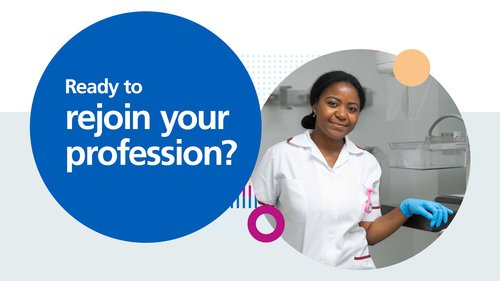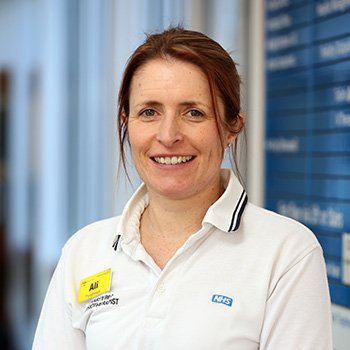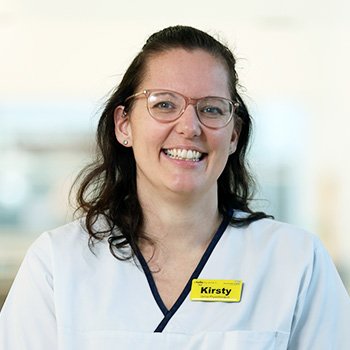Return to Practice (RTP): allied health professionals, healthcare scientists
If you're thinking of returning to the HCPC register, there is help, support and information to allow you to Return to Practice.

If you trained as an allied health professional (AHP) or a healthcare scientist (HCS), but have since left the profession, Health Education England run a programme that can provide help and information if you want to return to practice.
You already have the skills and experience to make a big difference to patients, clients, carers and their families and we want to help you on your return to practice journey.
Highly valued members of the NHS workforce
Allied Health Professionals and healthcare scientists are highly valued members of the NHS workforce. People may have stopped practising and let their HCPC registration lapse for a wide range of reasons, but we would love to welcome them back!
- If you have been off the register for two or more years, or if you did not register within five years of after qualification, you will need to undertake a period of updating your skills and knowledge. This can be undertaken within the healthcare educational and social care sector.
- If you are registered with the HCPC and have been out of your profession for 0-2 years there is no need to do any additional study or work experience. You can apply for relevant jobs straight away. However, if you would like to talk through your options, or require some support, please see the Health Care Professions Council website.
RtP stories
When you're considering returning to your profession, sometimes other people's success stories can help you to decide if this could be the right choice for you.
We've gathered these stories from professionals who are now back at work for Gloucestershire Hospitals NHS Foundation Trust (GHT) or at Gloucestershire Health and Care NHS Foundation Trust (GHC).
All of them are making a difference to patients, clients, carers and their families in Gloucestershire.
Alison's story
Alison is a Physiotherapist currently working for GHC.

What profession are you?
Physiotherapy
How long were you out of practice for?
10 years
What encouraged you to RtP?
I didn’t know what else to do once my youngest child had started school and had enjoyed physio previously
How did you find the RtP process?
It was straightforward for me, I applied for a Band 5 post and was able to complete my RtP while employed as a Band 3, then moved up to Band 5. The paperwork was simple and fairly minimal.
What benefits have you found with RtP?
It has allowed me to resume my career after a break to raise my children to school age, and part time work was easy to find.
What advice do you have for someone looking to RtP?
It’s not as daunting as it may seem. I think completing while in a clinical role is the simplest route rather than attending training or completing reflections etc.
Anna's story
Anna is a Physiotherapist currently working for GHT

What profession are you?
Physiotherapist
How long were you out of practice for?
10 Years
What encouraged you to RtP?
Home schooling 3 children during first lockdown while husband was deployed with the military! I needed to be a key worker again so my children could be in school. Also, I was from a respiratory background and felt very guilty that friends and old colleagues needed all the help they could get, I knew I still had the skills, but needed updating and wanted to do something to help. I always knew I wanted to return to the profession at some time and the pandemic gave me the push.
How did you find the RtP process?
Incredibly daunting to begin with. Then I found support from the HEE group set up by Paul Chapman and I eventually managed to secure a job as a Bank Therapy Support Worker (band 3) to help me gain Clinical Practice Hours that I could work around existing family commitments.
Once I gained confidence in the process that Return to Practice is guided by the individual to establish what they need to do to be able to meet HCPC requirements I found the process was relatively straight forward, although challenging.
What benefits have you found with RtP?
I have updated skills and knowledge that I knew were still there, but hadn’t used for many years, but also enjoyed learning how the profession has moved on during my time away. There was more that had remained unchanged than new skills to learn, which was a relief. Having life experience and maturity has also helped hugely on top of clinical skills; 10 years out of practice was certainly not a waste.
What advice do you have for someone looking to RtP?
- Contact HEE – there is support.
- Contact your own professional body for advice and sign posting.
- Trawl the internet for webinars and sources like twitter and YouTube have a great deal of resources, one benefit of the pandemic was how much learning and support was on line.
- There is also a wealth of resources from the HCPC on line – on their website and webinars on you tube.
- Contact your local trust to see if they have supported others in the past and if they are willing to support you.
Clare's story
Clare is an Occupational Therapist currently working for GHC.
What profession are you?
Occupational Therapist
How long were you out of practice for?
4 years
What encouraged you to RtP?
I left the profession to concentrate on having a family but I RtP as my children reached school age. I didn’t want to waste the training and experience I had as I knew I could make a difference to patients plus I always enjoyed my job and working as part of a team. I also enjoyed the challenge of the job.
How did you find the RtP process?
I found the self-directed learning aspect quite enjoyable; it was good to put time aside to update myself with current literature and guidelines. Practically it was difficult initially going back on to a ward environment but I soon settled back into it.
What benefits have you found with RtP?
I found the combination of theory and practice very beneficial. As the RtP is quite self-directed I could tailor my learning to my areas of weakness and where evidence-based practice was likely to have changed. I also received excellent support from my supervisor which helped guide my learning / experience. She was someone I knew from my previous practice and she was very enthusiastic about me wanting to return.
What advice do you have for someone looking to RtP?
It wasn’t as hard as I thought it would be, it’s amazing how quickly things come flooding back to you and in time it’s like you’ve never been away! Set yourself clear learning objectives so you know what you want to achieve. If possible try to find a placement / practice educator in an area that you are interested in returning to.
Helen's story
Helen is a Physiotherapist currently working at GHC.

What profession are you?
Physiotherapist
How long were you out of practice for?
17 years
What encouraged you to RtP?
I left physiotherapy to have my children and then lived in Germany for a few years. On coming back to the UK I worked different roles fitting around a young family and at that point physiotherapy was a distant memory. In 2019 I was made redundant when working for a small charity supporting patients and families with a rare disease and I was really unsure what path to take. By this point I was a single parent to 5 teenagers and I saw the role for a physiotherapy assistant in the community, I was still unsure whether I wanted to return to practice but I applied for the job and got it. I loved the work even more than the first time, I was surprised that my underpinning knowledge was still there and my life experiences I feel have made me a better physiotherapist. It took me 2 years to take the leap to return to practice.
How did you find the RtP process?
The biggest hurdle was confidence in my own skills. Once I realised I could use all that experience as a physiotherapy assistant towards my re-registration the process was then very straight forwards, the forms were simple to complete. I was lucky that my manager was very supportive and allowed me to attend the Band 5 in-service training and also was able, under supervision, to see patients suitable for a qualified physiotherapist. Being an employed physiotherapy assistant allowed me to continue to be paid and support my family so the required hours needed was easy to complete. I also used future learn free courses to brush up my knowledge on anatomy, physiology and physiotherapy for Parkinson’s Disease. Plus reading the CSP magazine frontline and accessing research articles from the journal. There are also many podcasts freely available that were useful to learn about latest practice.
What benefits have you found with RtP?
I returned to practice a year ago as a Band 5 physio and I have just been successful in promotion to a Band 6 physiotherapy role. I also have potential career progression and the ability to support my children. I am happy to be back working as a physiotherapist.
What advice do you have for someone looking to RtP?
If like me you are unsure, I would recommend returning as a PTA and then take opportunities to learn and get back to practice. This took the pressure off and there was no rush and I was still able to support my family during the process.
- The forms are not difficult to complete
- Certain things have changed – especially admin – but the physio fundamentals remain the same.
- Your colleagues will be supportive as they will want you to return to practice
- Your life experiences count and will add to your practice.
Karen's story
Karen is an Occupational Therapist currently working for GHT.
What profession are you?
Occupational Therapist
How long were you out of practice for?
6 Years
What encouraged you to RtP?
My children were older and I felt I was missing out on other spaces of my life that I used to enjoy, craving new knowledge! My best friend is an OT and really encouraged and supported me.
How did you find the RtP process?
I found a great job as a therapy support worker band 4 with really supportive therapists that enabled and encourage me to work as an OT, giving me great opportunities, mentorship and supervision. I found the registration side with The Royal College of Occupational Therapists really straightforward.
What benefits have you found with RtP?
Developed my self-confidence, proven to myself that I still had the skills and knowledge to do my job and manage family life too, even as a single mother. Real enjoyment in undertaking professional development, engaging in quality service improvements, workshops, conferences has given me a new passion for my career.
Kirsty's story
Kirsty is a Senior Physiotherapist currently working for GHT.

What profession are you?
Senior Physiotherapist
How long were you out of practice for?
8 years
What encouraged you to RtP?
I took a career break in order to raise my children, once my youngest started school I had the time and opportunity to RtP. I really enjoy working as a physiotherapist and did not want to let my knowledge, experience and passion go to waste.
How did you find the RtP process?
The hardest part of the RtP process was finding an employer that would support me through the RtP, once I had that secured, I found the process to be time consuming, challenging and rewarding. I was pleasantly surprised with how much previous knowledge and skill came back; I was worried that I would have forgotten a lot!
What benefits have you found with RtP?
I found it helpful to not have the pressure to be working at a qualified professional level and was able to ease back into the work environment.
It allowed me to regain my confidence following years away from the profession with support and opportunity for study.
What advice do you have for someone looking to RtP?
- Do it!
- Ensure you have thought through/researched and fully understand exactly what are the requirements you need to meet.
- Give yourself time.
- Enjoy!
Leona's story
Leona is an Occupational Therapist currently working for GHC.
What profession are you?
Occupational Therapist
How long were you out of practice for?
13 years
What encouraged you to RTP?
After working in the art room at the hospice for a couple of years, I went on an art therapy course and realised that this wasn’t for me as I still saw things from an OT point of view. I was encouraged to do my RTP
How did you find the RtP process?
At the time (2017) it was difficult as there was no process or pathway recognised by anyone or much support when I started. I was able to learn by myself to contribute to the hours and some short free courses. There was a course in Derby, but I didn’t feel that offered me the leaning I really needed to do to enable me to be an OT again. However, by the time I was finishing there was some support from Paul Chapman through HEE. I was able to set up my placement hours myself with 2 OTs in Together trust and Gloucestershire care services. This was not easy as I was neither a student nor a registered OT, so nobody quite knew what to do with me; however, I think things have changed since then!
I was really pleased that I managed to complete the number of study hours and the placement hours within this Trust, and was able to register as an OT after about a year
What benefits have you found with RtP?
The benefit is that I was able to gain lots of experience and support from colleagues from my placements to enable me to work again as an OT, and now am able to work in the NHS again as an OT (this was now nearly 5 years ago).
What advice do you have for someone looking to RtP?
It’s well worth it. Hopefully the process and pathway for achieving this is easier than it was 5 years ago.
Carole's story
Carole is a Diagnostic Radiographer currently working at GHT.
What profession are you?
Diagnostic Radiographer – mammography
How long were you out of practice for?
18 years
What encouraged you to RtP?
I continued to work in health care in a variety of staff development / project roles but always thought in the back of my mind radiography was something I would return to. In early 2020 after living abroad I returned to the UK and was looking for work and it just felt like the right time.
How did you find the RtP process?
I looked on the HCPC website to see what I needed to do, then applied for an assistant position. I was open in my application and interview that my goal was to return to the HCPC register as a mammographer. I was asked to apply for a mammographer position and was offered that role. Whilst doing my updating I was paid as a Band 4 working supervised initially. I then moved to Band 6 once I’d completed the department competences, HCPC updates and re-registered.
The department has lots of experience of training assistant practitioners and had a very supportive education lead. There is a lot of material on elearning for Health that helped with my self-directed learning. I also read articles, shadowed senior colleagues and wrote reflective accounts for my portfolio.
What benefits have you found with RtP?
Whilst initially the paperwork and requirements seemed daunting it was relatively straightforward. It didn’t take long at all to get back into the swing of things. Whilst a lot of the technology has changed with digital imaging, there is a lot that is the same such as the positioning.
It’s great to return to the profession I trained for.
What advice do you have for someone looking to RtP?
- Do it - You have so much to offer and the NHS really needs you!
- The employed route is the easiest option, try an assistant role if you’re not sure and need to take more time.
- There’s lots of resources and people to support you. Keep a portfolio of evidence - you don’t have to submit this but it may be asked for by HCPC.
Karen's story
Karen is a Podiatrist currently working at GHC.
What profession are you?
Podiatry
How long were you out of practice for?
9 years
What encouraged you to RtP?
The pandemic – I had a skill set that could be used and felt guilty I was not using it. My children were both at senior school.
How did you find the RtP process?
Fairly simple – to find a placement
Sometimes, it's challenging to communicate directly with the HCPC. I had a friend who had already been through the process who was able to give advice.
What benefits have you found with RtP?
I am now working for the NHS 2.5 days a week
What advice do you have for someone looking to RtP?
- Take your time
- Get as much experience with the specialisms within your profession.
Sometimes it felt like there was a lot of assumptions that I know things because in my previous NHS life I was a band 7 – so ask lots of questions!!
Contact our National Return to Practice team: R2PAHP-HCS@hee.nhs.uk